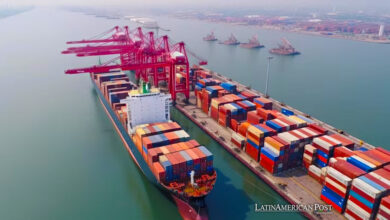Are we on the brink of a new Cold War?
The Biden administration shows no clear intentions to reduce the tension between China and the United States that he inherited from Donald Trump.

President Jinping’s speech in Davos may give hints of things to come on the political and economic scene. / Photos: TW-JoeBiden, Reuters
LatinAmerican Post | Moisés Campos
Listen to this article
Leer en español: ¿Estamos al borde de una nueva Guerra fría?
The new "Cold War" is currently being played out in the economic and ideological scenario, where China, under the mandate of Xin Jinping, has been gaining ground, making the country the second-largest economy in the world, despite the pandemic. The strained relations sustained during the Trump presidency could turn into a better one under Biden, but the issue of Taiwan, Hong Kong and human rights, remains a factor causing tension. President Jinping's speech in Davos may give hints of things to come on the political and economic scene.
China dijo que quiere cooperar con el Gobierno de Joe Biden, al tiempo que anunció sanciones contra 28 estadounidenses, entre ellos al exsecretario de Estado Mike Pompeo, así como a Peter Navarro, John Bolton y Stephen Bannon pic.twitter.com/azFacn8f4c
— Reuters Latam (@ReutersLatam) January 21, 2021
Xin Jinping's speech in Davos
Xin Jinping participated in the Davos Forum, which is held virtually, and caused different reactions, especially for his call to avoid a new Cold War and multilateralism. The Director-General of the International Labor Organization, Guy Ryder, said he was satisfied that the speech focused on international cooperation.
China advierte sobre 'una nueva Guerra Fría' https://t.co/nTCBqDVI4B
El régimen comunista teme que Biden quiera unir a los países occidentales contra el gigante asiático. pic.twitter.com/L8iDfr8ACg
— Portafolio (@Portafolioco) January 26, 2021
The president argues that international collaboration should be encouraged, where China can play an important role in economic recovery, Rudolf Minsch, chief economist of the Swiss national business federation, Economiesuisse, explained in a statement. He also offered his help to countries that are less prepared to handle the pandemic. President Jinping places the country in a position of undisputed leadership, entering the United States – Russia axis as undisputed world leaders.
United States – China – Russia axis
Helen Sugelly León Ortega in the article published in the RI magazine of the National University of Costa Rica raises how Trump and Putin, despite disagreements on certain issues, such as the Iranian nuclear program and the crisis in Syria, tried to establish a respectful relationship between the two countries.
In the article by León Ortega, it is proposed how a state of constant tension, as a result of conflicts not overcome during the Cold War, which is fueled by the particular interests of each country, and which is far from a short-term solution, it has allowed China to enter the game, relying on its economy for political triumphs. The author refers to Fernández Riquelme, who affirms that the total dominance of the United States gave China the opportunity to strengthen its international influence.
China has, for the first time, the possibility of emerging as an alternative leader to the United States and Russia, bypassing international institutions and avoiding meddling in the internal politics of countries. The United States is in the position of preventing the establishment of an alliance between Moscow and Beijing, since, according to specialists interviewed by the author, such as Facon and Schreiber, it could turn into a negative situation for this country.
You may also be interested in: The role of Latin America before Brexit
To counter Chinese influence, the United States should draw closer to Russia. All this raises a scenario, where the economy will be a decisive factor in the power game of these three countries, heralding a scale in tensions, plunging the world into a new cold war.
Trump, Biden and their positions on China
In the article by Xulio Ríos, director of the Observatory of Chinese Policy, published on his website, he exposes how in the United States during 2020, Trump's policy towards China was hardening, motivated not only by differences in commercial aspects, economic and technology but also by the pandemic and the crises in Taiwan and Hong Kong, without neglecting the criticism of Chinese policy in different countries, especially in Latin America.
In the speeches of Mike Pence at the Hudson Institute, in October 2018 and Mike Pompeo at the Nixon Library and Museum, July 2020, it is taken as a point of agreement that the two-point to China as the enemy to defeat. This provoked a response from the spokesman for the Ministry of Foreign Affairs, Hua Chunying, who affirmed that China was not an aggressive country, but that it will know how to respond to the provocations and harassment established by the trade war initiated by Trump.
This trade war can be considered a failure because the opposite effect was obtained and China managed to establish a growth pattern that led it to shorten its distance with the United States, as Ríos points out in his article, Trump leaving relations with China to the ending his term at a pretty tense point.
Joe Biden announced that under his mandate he hopes to work in collaboration with countries traditionally allied with the United States, in order to create strategies to try to contain China, emphasizing cybersecurity and information technology, the opposite of the position taken over by Donald Trump. Ríos in his article affirms that it is predicted that the issue of human rights in China and ideology will gain even more importance in the Biden government.
The role that countries like Japan, India, and Australia, and probably the European Union, decide to play is crucial in determining what the position of the United States will be and whether they will support Washington's decisions.
As for China, it continues with a policy of rapprochement and cooperation with Russia, developing several joint projects and becoming its largest trading partner. In the same way, the support offered by Jinping for the management of the pandemic and its effects in Latin American countries and the rest of the world opens up, even more, the possibility of increasing tensions and deepening a Cold War, which China wants to avoid.



